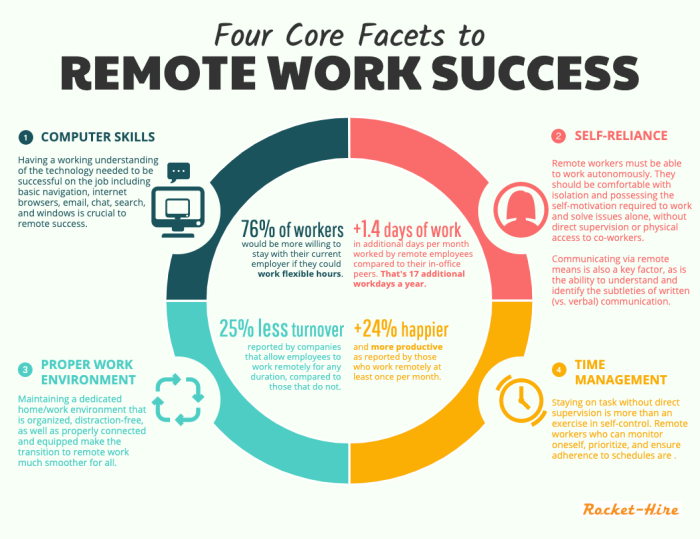Remote Work Productivity takes center stage in today’s work landscape, offering a glimpse into the advantages, challenges, tools, and tips for thriving in a remote work environment. Get ready to dive into a world where flexibility meets efficiency, creating a seamless workflow that maximizes productivity.
Benefits of Remote Work Productivity

Remote work productivity comes with a myriad of advantages that can revolutionize the way we work. Let’s explore how remote work can enhance productivity compared to traditional office settings and the positive impact of flexibility on remote work productivity.
Increased Focus and Efficiency
- Without the distractions of a traditional office environment, employees can focus better on their tasks and complete them more efficiently.
- Remote work allows individuals to customize their work environment to suit their preferences, leading to improved concentration and productivity.
Improved Work-Life Balance
- Remote work offers employees the flexibility to create a schedule that works best for them, enabling a better balance between work and personal life.
- Eliminating long commutes to the office saves time and reduces stress, contributing to a healthier work-life balance.
Cost Savings for Employers and Employees
- Companies can save money on office space, utilities, and other overhead expenses by promoting remote work, leading to increased profitability.
- Employees can save on commuting costs, work attire, and meals, resulting in more disposable income and overall satisfaction.
Enhanced Collaboration and Communication
- Remote work encourages the use of digital collaboration tools, fostering better communication among team members regardless of their physical location.
- Virtual meetings and project management platforms enable real-time collaboration and seamless information sharing, enhancing teamwork and productivity.
Challenges of Remote Work Productivity

Working remotely comes with its own set of challenges that can hinder productivity if not addressed effectively. Let’s explore some common obstacles faced by individuals working in a remote setup and strategies to overcome them.
Distractions in a Remote Work Environment
One of the biggest challenges of remote work is dealing with distractions that are not present in a traditional office setting. Whether it’s household chores, noisy neighbors, or social media, staying focused on work can be tough. To overcome distractions, it’s essential to create a dedicated workspace free from interruptions. Setting boundaries with family members or roommates and establishing a routine can also help minimize distractions.
Maintaining Work-Life Balance
Another challenge of remote work is maintaining a healthy work-life balance. Without a clear separation between work and personal life, it’s easy to find yourself working late into the night or constantly checking emails during off hours. To maintain work-life balance, establish set work hours and stick to them. Make time for breaks, exercise, and relaxation to prevent burnout. It’s also important to disconnect from work at the end of the day to recharge and avoid feelings of being constantly “on.”
Tools and Technologies for Remote Work Productivity
When it comes to remote work productivity, having the right tools and technologies at your disposal can make a world of difference. These resources are essential for staying organized, collaborating effectively with team members, and ensuring data security.
Essential Tools for Enhancing Productivity
- Communication Platforms: Utilize tools like Slack, Microsoft Teams, or Zoom for seamless communication with colleagues.
- Project Management Software: Platforms such as Trello, Asana, or Jira can help you track tasks, set deadlines, and monitor progress.
- Cloud Storage Services: Store and access files easily with services like Google Drive, Dropbox, or OneDrive.
- Time Tracking Apps: Keep track of your work hours and productivity levels with apps like Toggl or Harvest.
How Project Management Software Can Improve Collaboration in Remote Teams
Project management software provides a centralized platform for team members to collaborate, assign tasks, track progress, and communicate effectively, regardless of their physical location.
The Importance of Cybersecurity Measures When Working Remotely
- Use VPNs: Virtual Private Networks encrypt your internet connection, protecting sensitive data from potential cyber threats.
- Strong Passwords: Create complex passwords and enable two-factor authentication to secure your accounts and devices.
- Update Software: Regularly update your operating system and software to patch vulnerabilities and protect against malware.
- Secure Wi-Fi Networks: Avoid connecting to public Wi-Fi networks and use secure connections to prevent unauthorized access to your data.
Tips for Improving Remote Work Productivity
When working remotely, it’s essential to implement strategies that can help you stay focused, motivated, and productive. Here are some tips to enhance your remote work productivity:
Effective Time Management Techniques
- Set a daily schedule and stick to it to create a sense of routine.
- Use time-tracking tools to monitor your work hours and identify areas for improvement.
- Prioritize tasks based on deadlines and importance to avoid feeling overwhelmed.
- Take short breaks between work sessions to recharge and maintain productivity.
Strategies for Staying Motivated and Focused
- Set clear goals for each day or week to stay motivated and track progress.
- Create a designated workspace that is free from distractions to enhance focus.
- Reward yourself for completing tasks or reaching milestones to stay motivated.
- Stay connected with colleagues through virtual meetings or chats to combat feelings of isolation.
Setting Boundaries to Boost Productivity, Remote Work Productivity
- Establish specific work hours and communicate them with your household to minimize interruptions.
- Define limits for checking emails or responding to messages outside of work hours to maintain a healthy work-life balance.
- Create a clear separation between work and personal activities to prevent burnout and improve productivity.
- Learn to say no to additional tasks or meetings that may hinder your productivity without feeling guilty.










